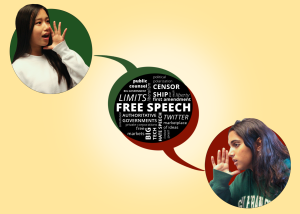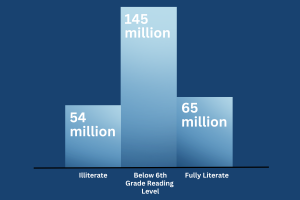Free speech…
December 12, 2022
“Congress shall make no law… abridging the freedom of speech… or the right of the people peaceably to assemble, and to petition the Government for a redress of grievances.”
The First Amendment, adopted in 1791, protects many rights, including the freedom of speech. A subsection of the freedom of expression, this gives people the right to voice themselves without government restraint. Except for select cases incurring dangerous ramifications, the majority of speech is protected.
“The 1st Amendment does guarantee free speech, but there have been various levels of restraint throughout U.S. History,” social studies teacher David Pugh said. “There are currently laws pertaining to hate speech and insurrection but also, movies were censored in the 1930’s and TV in the 1930’s and ‘40’s.”
Freedom of speech is crucial to a functioning democracy that runs on open debate. While censorship limits a diversity of opinions, free speech is the basis for a marketplace of ideas: a system where the best policies will eventually emerge through inevitable competition with worse policies. This concept assumes that there is inherent hierarchy to ideas and applies the economic concept of the free market to ideas and policies. Allowing the marketplace of ideas to flourish will allow the public to decide and debate on different perspectives. While many aim to prevent circumstances incurred by hate speech, suppressing hate speech may not prevent violence, as prohibiting one from talking may not deter their core beliefs. It could in fact elevate their bias on the topic, since they are censored from discussion of it.
“If taboo topics are censored, it will create more confusion and speculation about these topics, making it harder to find the truth,” said junior Rohan Patel, a pre-trial attorney on the Lynbrook Mock Trial team.
Countries that have more repressive governments impact citizens negatively. For instance, Chinese authorities often censor citizens’ opinions if they contrast those of the Chinese Communist Party. This has been shown by Chinese authorities to violate other rights, including the access of information, and Chinese authorities have the legal right to oversee online content. Not only is this suppression harmful towards Chinese citizens, it also endangers other countries by blocking the flow of crucial information; for example, a lack of clarity around the origin of COVID-19 has contributed to already flourishing conspiracy theories.
“China has had power struggles between an oppressive government and the oppressed people for a long time, and their silence only serves as a catalyst for further conflict,” sophomore Elizabeth Jiang said.
The Iranian government has also historically enforced strict rules regarding the freedom to speak one’s mind. Mahsa Amini, a 22-year-old Iranian woman, died in police custody on Sept. 16 after allegedly wearing an “improper hijab.” Following Amini’s death, many started to protest against the way the Iranian government used violence to maintain religious cultures. This resulted in the shutdown of multiple social media sites in order to try to stop information spread of the protest, which failed. When censorship was ineffective in stopping the protest, police resorted to violence, killing and imprisoning hundreds of citizens.
As seen through the wave of popular uprisings and unrest in authoritarian leaning countries, putting limits on freedom of speech incites civil unrest and in turn, state violence. From China’s censorship during the COVID-19 outbreak to Iran’s censorship during Amini’s death, censorship and state moderation of ideas and free speech have only led to political unrest and needless violence.



























































